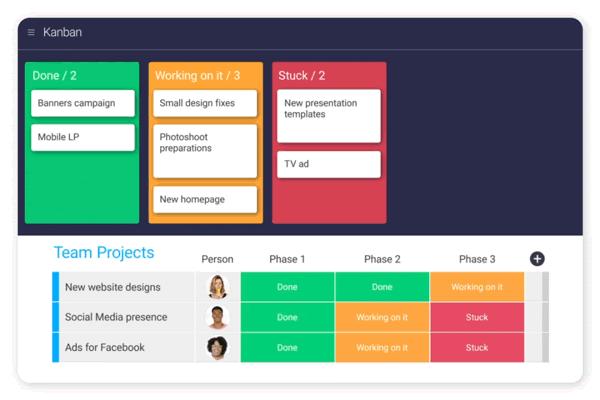
Office Administrator vs. Office Manager: What’s the difference?
While it’s easy to assume an Office Manager (OM) and an Office Administrator (OA) do the same thing, the two positions have subtle differences that could add up over the course of one career.
(PS – Get more sh*t done with The Assist — the #1 free weekly newsletter made for assistants by assistants.)
We’ll take an in-depth look at the two positions below, but here’s your quick take on the key differences between an OA and OM. (Note: You’ll likely find exceptions to these statements, depending on the particular company and role in question.)
- Office Managers focus on “people” processes. They keep offices running happily and efficiently by providing employees with tools, resources, policies, and initiatives that enable good work.
- Office Administrators focus on “technical” processes. They keep offices running strategically and efficiently by implementing and improving technology solutions, processes, and schedules that keep work flowing – we recommend using a software like monday.com.
A Typical Workday
A Day in the Life of an Office Manager
A day in the life of an Office Manager will look different at nearly every company, but the bulk of any OM’s day will likely involve managing office processes to help work run as efficiently as possible and keep employees happy and productive. An OM might have to take a high-profile client on an office tour one day and then lead a new-employee orientation training the next day.
Excitement, variation, and most importantly, people make OM roles rewarding for high-energy individuals. In an interview with Artisan Creative, one Office Manager says, “I think the most rewarding part of my job is completing tasks that I know will make someone else’s day just a little bit easier.”
Here’s an example of an OM’s to-do list for one day. (This could be everything an office manager plans to do, but naturally, every single day will come with a variety of surprises.)
- Check kitchen and coffee station supplies. Place monthly coffee and snack order; schedule delivery for Friday afternoon.
- Meet with office admin team to develop weekly priorities and benchmarks.
- Run and export weekly payroll report.
- Visit new hires (3 this week) to deliver key fobs and review security procedures.
- Call vendor to schedule installation of the new audiovisual system in the main conference room.
- Get CEO’s sign-off on the final itinerary for upcoming company retreat.
- Send email invitation for company retreat.
- Meet and greet new client before 2PM meeting with Marketing team.
- Log newly-received invoices.
- Check in on 90-day hires to make sure everything is going smoothly.
- Have Controller sign next month’s budget.
- Research and price office-friendly plants for new wellness initiative.

A Day in the Life of an Office Administrator
Office Administrators take on different tasks every day, but nearly everything OAs do will require an eye for efficiency and an intense attention to detail. Tasks, like booking international travel and evaluating potential IT purchases, have little in common on the surface, but both items require someone who listens carefully, asks the right questions, thinks strategically, and makes decisions independently. A day in the life of an Office Administrator involves plenty of mental exercise.
Here’s an example of an OA’s to-do list for one day. Just like OMs, OAs field many last-minute requests in any given day.
- Spend one hour on the proposal for a new inventory tracking system
- Have demo call with potential new IT security vendor; draft brief to present to Chief Information Office (CIO).
- Book flights and transportation for all executives (5) traveling to Canada for the annual industry conference.
- Go through leadership team’s latest meeting requests, schedule meetings, and update and sync calendars.
- Respond to all emails in the office account. (Spend extra 30 minutes on this today to catch up.)
- Process invoices received last week.
- Process all reimbursement requests in queue.
- Coordinate client airport pickup and dinner reservations for next week’s summit.
- Reach out to list of applicants from Human Resources to schedule phone interviews.
- Clean out supply closet in conference room 2.
- Send email about new parking procedures effective next month.
Office Manager vs. Office Administrator: The Specifics
We pulled together these lists of responsibilities, skills, and qualifications below by comparing several current job descriptions for Office Managers and Office Administrators working in a variety of industries. You can view the lists as general overviews for what to expect, as the core duties and requirements for these versatile positions can vary radically from company to company and even city to city.
Responsibilities
Office Manager Responsibilities:
Summary: Office managers implement and oversee policies and procedures that nurture efficient environments where employees thrive. OMs serve as the “faces” of their companies, both internally and externally; office visitors usually meet the OM before anyone else, and employees usually visit the OM first when they have questions or concerns.
- Handles inventory and ordering of office supplies, kitchen items, and other incidentals necessary for office operations
- Oversees other office support staff members
- Implements critical safety procedures, including establishing evacuation plans, running drills, and setting up building security
- Keeps books and records
- Manages payroll
- Owns invoicing processes
- Determines company’s information organization and architecture
- Interfaces with clients, vendors, building management, and employees on a regular basis
- Maintains office equipment and troubleshoots when necessary
- Runs major office projects, such as renovations, installations, and office design initiatives
- Manages office budget
- Negotiates and tracks contracts
- Fields main office calls
- Prepares office mailings
- Trains and orients new staff members
- Coordinates schedules for office conference rooms
- Assists with new employee onboarding & off-boarding, including determining seating charts
- Guides office layout improvements
- Plans meetings and events
- Hears (and resolves issues related to) complaints
- Resolves employee conflicts
- Creates and presents reports as requested

Office Administrator Responsibilities:
Summary: Office Administrators strategically complete all need-to-do items around the office. They also find ways to make work even faster and more efficient. Employees who’ve noticed a sudden improvement in procurement processes might just have an OA to thank.
- Orders and maintains office supplies and services, including IT resources, facilities, and standard supplies
- Represents office interests in relationships with external associates, including vendors, consultants, and clients
- Assists in recruiting and hiring new employees
- Oversees office financial administration, from handling expenses to implementing processes
- Develops initiatives related to company culture and employee wellness
- Handles travel calendars, itineraries, and bookings
- Accepts and responds to organizational phone calls, emails, and traditional mail correspondence
- Collaborates across departments to help plan events and initiatives
- Assists with staff schedules and executive calendars
- Provides as-needed support (scheduling, planning, etc.) to directors, managers, and executives
- Fields technical and logistical questions
- Creates reports and presentations
- Helps with meeting and event planning
- Keeps shared office spaces organized
- Handles incoming and outgoing packages and mail
- Handles office communications
(PS – Get more sh*t done with The Assist — the #1 free weekly newsletter made for assistants by assistants.)
Skills
Office Manager Skills:
Summary: Office Managers have lots of energy, analytical skills, and emotional intelligence. With these foundational skills, a motivated prospective OM can quickly pick up additional knowledge and competencies to thrive.
- Understands and interprets complex information related to both abstract (relationships) and technical (inventory management) office responsibilities
- Uses emotional intelligence to address human-driven office complications
- Listens well and quickly processes verbal communication
- Communicates effectively both in speech and writing
- Adapts to changing demands and responsibilities
- Works independently
- Stays flexible and organized
- Leads others and delegates tasks
- Manages time strategically
- Guides projects and workflows from initiation to completion
- Catches details both big and small

Office Administrator Skills:
Summary: Office Administrators have a knack for organizing and processing information, turning out smart, informed decisions and getting things done.
- Keeps work organized
- Manages time and processes with an eye for efficiency and strategic changes
- Solves both logistical and human problems
- Simultaneously manages priorities
- Takes initiative in solving problems and improving processes
- Writes and speaks with clarity
- Works on tasks with resourcefulness and flexibility
- Remembers key details
- Maintains organization of information, processes, and physical spaces
- Makes decisions without supervision
- Works quickly, but accurately
Qualifications
Office Manager Qualifications:
- Bachelor’s degree (B.A.) or equivalent
- 2-4 years related experience
Office Administrator Qualifications:
- Bachelor’s degree (B.A.) or equivalent
- 1-2 years related experience
- Expert command of standard office tools, such as Microsoft Office Suite and Automatic Data Processing (ADP)
Career Paths
Both Office Managers and Office Administrators have bright career paths, filled with unlimited potential. In just a few years, OMs and OAs can learn more about the ins and outs of running businesses than many employees working in specialized fields will gain over several years. People in these positions learn to think on their feet, and they also gain experience solving mission-critical problems without assistance from bosses or upper management. Furthermore, these roles get to know everyone across the company. This means they can learn how many jobs across the company work, develop outstanding intrapersonal skills, and do all the networking they need to switch careers within the company.
In addition to positioning themselves for both upward and horizontal mobility, OMs and OAs often pick up the complete skill set required to make successful entrepreneurs or operational consultants.

Office Manager Career Path
Mastering the well-rounded position of Office Manager can open up many doors and many career paths. OMs have the chance to grow into high-level managers, especially if they develop a knack for problem-solving and long-term strategic planning. They can also specialize in particular aspects of the role, going into HR positions, accounting roles, company training positions, and more.
According to the Princeton Review,
“The future of Office Managers looks bright. Many economists predict that the economy will continue to grow and provide more office managing job opportunities over the next six years.”
Some OMs master the basics of their roles in small firms and then grow into new OM roles at larger companies. OMs who move to larger companies will likely perform the same basic functions, but they often take on more responsibilities. These shifts help OMs expand their roles as they expand their skills.
Office Administrator Career Path
As Office Administrator jobs provide plenty of challenges and versatility, OAs can carve fulfilling careers from job-specific tasks and skills of deepest interest. For example, an OA who has found stride in office event and meeting planning can leverage that experience to land a full-time event planning gig. An OA who has developed a close working relationship with one specific executive might move into the role of high-level executive assistant. An OA who has developed or worked on several employee wellness programs might end up as the company’s Chief Wellness/Happiness Officer or in some cases a Chief of Staff.
In short, the career advancement possibilities for a motivated and ambitious Office Administrator have few limits. OAs with particular career goals in mind should be sure to pursue projects and responsibilities aligned with those goals to build stellar resumes.
Questions Office Managers and Office Administrators Field in a Day
Job descriptions provide a wonderful glimpse of core responsibilities, the bullet points a person in the position will face during annual reviews and other performance check-ins. However, job descriptions don’t give applicants or new hires an idea of the kinds of questions and one-off requests they’ll likely face in any given day. No one can control this aspect of the job, but OMs and OAs who prepare for anything and everything will experience less on-the-job stress.

What people ask (or say to) Office Managers:
- We’re out of toilet paper.
- When’s the next company retreat?
- How do I reset my computer password?
- I lost my bathroom key.
- Can you proofread this email?
- What should we do for our fall outing?
- What’s the serial number on the 2nd-floor printer?
- How do I access my voicemail?
- Can you give [insert client] an office tour?
- My interview arrived early; will you keep her company?
- Does our office lease say anything about animals?
- Does our office lease say anything about painting the walls?
- When is this payment due?
- What was the invoice number for the [insert vendor] April payment?
- Can we turn down the air conditioning?
- Was Jim reimbursed for the hot dogs?
- Can we turn up the air conditioning?
- How can we make the office more cheerful?
- Can I book the conference room Thursday at noon?
- How do I order food for a lunch meeting?
What people ask (or say to) Office Administrators:
- When will the printing paper order be delivered?
- Do you think [insert client] liked the presentation?
- How do I work the speakers in the conference room?
- How do I access my voicemail?
- The refrigerator smells funny.
- Will you book my plane ticket for the Iceland conference?
- How many new hires did we have in March?
- Can you clear my schedule for the afternoon?
- Do I have any meetings tomorrow?
- When’s the next holiday?
- Can you run tomorrow’s presentation for [insert vendor]?
- Something’s leaking from the air vent in conference room 1.
- Do we have an office dress code? What does it say about flip-flops?
- Can you talk to [insert vendor] and let me know if [insert tool] is worth the money?
- Did we include any vegetarian options in tomorrow’s lunch meeting order?
- Can you make sure everyone knows about the new remote work policy?
- Did I get a package today?
- How do you think we can improve our company culture?
- Are the employees happy?
- Do you think [insert employee name] is enjoying his new role?
Are you an experienced OM or OA? Help out new hires and applicants by leaving your expert advice in the comments below!
(PS – Get more sh*t done with The Assist — the #1 free weekly newsletter made for assistants by assistants.)









I am an office Admin but I am partially doing both the jobs. I think it depends more on company to company. But I love my job. It gives me so many opportunity to grow and expand my knowledge base.
Last week I stared a new job as a office manager, some of the girls are having a hard time with me been the office manager, it is been very difficult for me to have them to do what i asked them to do.any suggestions?
Yes, improve your grammar, punctuation and spelling. Otherwise, no-one will respect you.
I have been both but personally prefer the OM Vs OA simply because I’m a people person.
Interesting point, Norma!